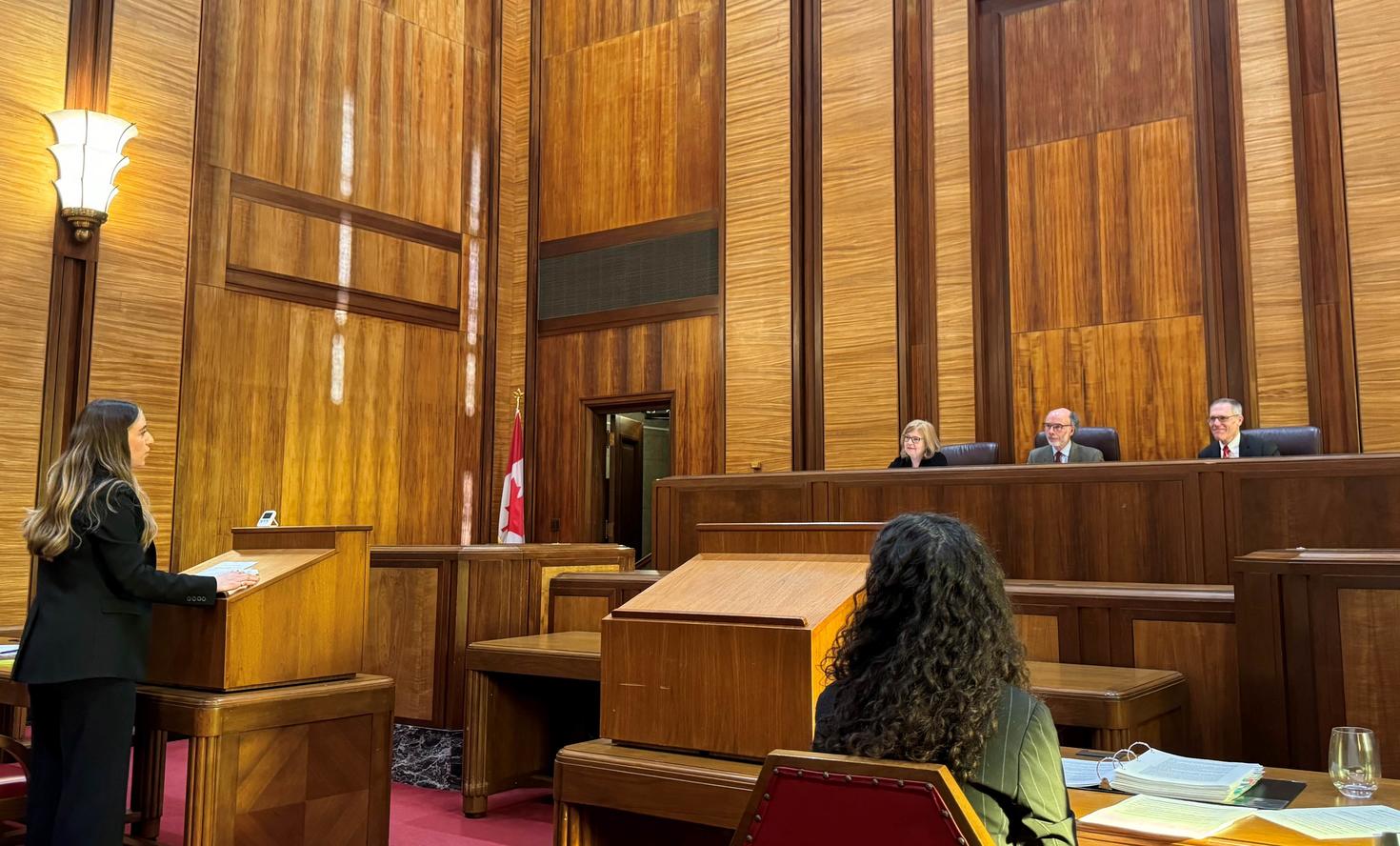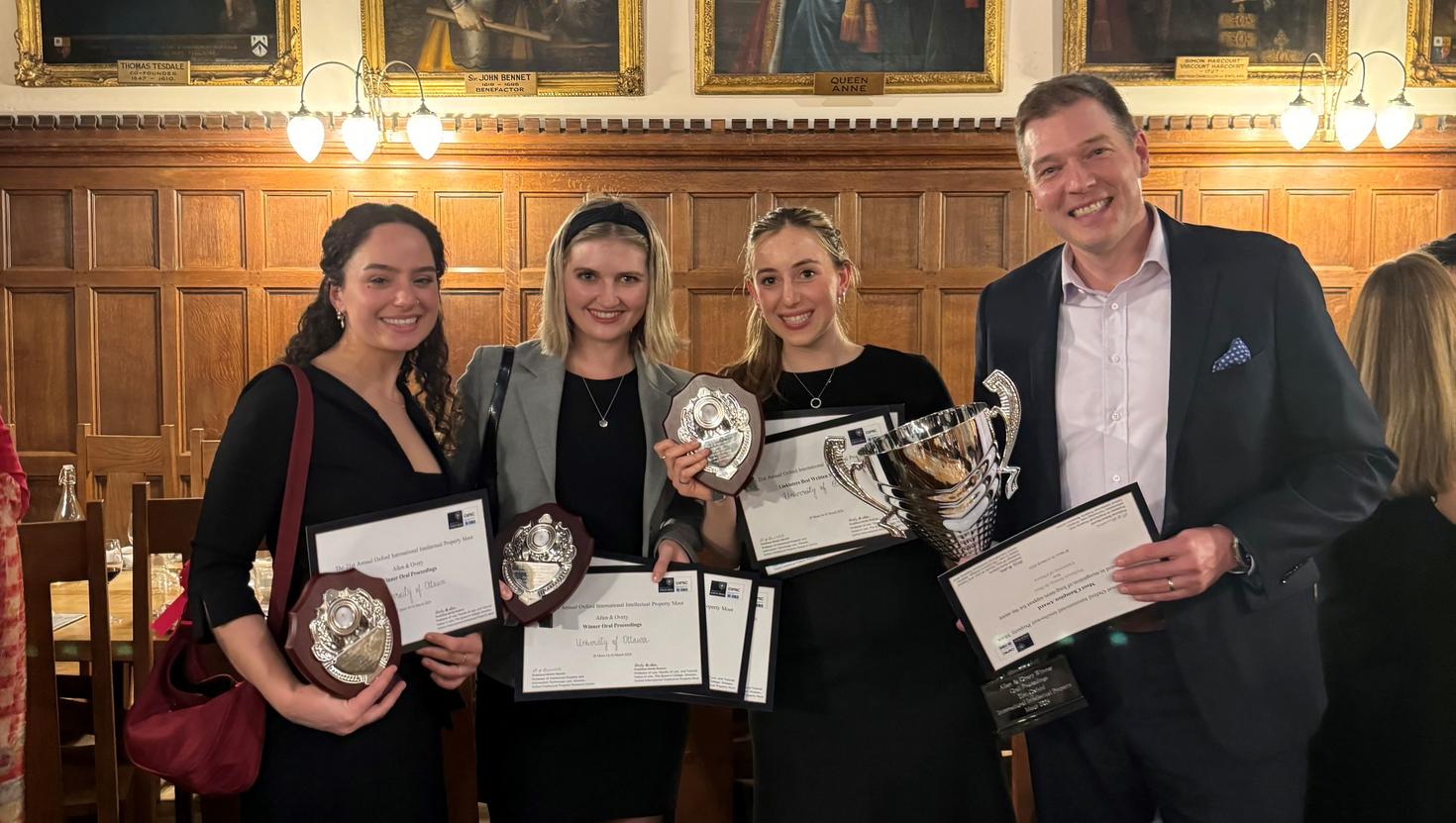Having also won the 2024 Harold G. Fox Intellectual Property Moot, uOttawa is the only school to have ever won both the national and international competition in the same year.
The team including Jordan Geist, Hannah Goold, and Emily Thompson also won the prize for best written submissions. The rare or perhaps unprecedented accomplishment of winning both the oral and written moot stages is a testament to the strength of these students and uOttawa’s IP stellar advocacy program. In addition, Hannah Goold won a top-4 best speaker award and, in recognition of long-term support for the moot and its students, an inaugural “Moot Champion Award” was given to Professor Jeremy de Beer.
At uOttawa’s Faculty of Law students enrol in a pair of unique courses offering world-class training in all dimensions of IP advocacy: written and oral advocacy in intellectual property. Our students learn experientially in the law school’s Ian G. Scott Courtroom, a fully functional courtroom-classroom where sitting judges hear regular cases, including motions, appeals, judicial reviews and applications.

Arguing their final dress rehearsal in the Supreme Court of Canada was a top highlight of this year’s preparation. Appellate-court Justices Rennie, Gleason, and Locke judged the students as they tested submissions in the Supreme Court building’s imposing courtroom.
The team’s coaches – Professor Jeremy de Beer and CLTS’s in-house litigators at the Samuelson-Glushko Canadian Internet Policy and Public Interest ClinicDavid Fewer and Christian Clavette – could not be more thrilled with the learning outcomes for our students. While Jordan Geist, Hannah Goold, and Emily Thompson’s razor-sharp intellect and remarkable work ethic will carry them far in their careers, most impressive are the teamwork and selflessness they showed throughout the learning process.
Rehearsals for uOttawa students also involve in-firm mentorship from some of Canada’s top law firms and IP litigators, many of whom are themselves alumni of uOttawa’s IP moot program. This year’s students benefited immensely from working with (in alphabetical order): Tracey Doyle, Jasmine Godfrey, and Ana Nizharadze at Bennet Jones, Kevin Siu at Gilbert’s; Jenny Hepditch and Nevena Cekic at Gowling WLG; Steven Garland and Matthew Norton at Smart & Biggar; Kaitlyn Margison and Michael Forberg at Olser (Ottawa); Matthew Diskin and Nathaniel Lipkus at Osler (Toronto); Laura MacDonald at McCarthy Tetrault; and Fred Wu of Wu Law. Current Federal Court of Appeal law clerks Hannah Cinel & Emma Walsh, and uOttawa moot-winning alumna Abigail Smith and (now TMU professor) Alexandra Mogyoros were equally generous in sharing their insights and experiences.
The 2024 moot problem raised legal issues of patent and design law, as applied to a dispute between rival shoe companies operating in the athletic and fashion industries. Students argued over the novelty of inventions and a “right to repair” consumer goods, as well as the legal lines around functional designs and infringement standards.
Sir Richard Arnold and Lord Justice Colin Birss of the Court of Appeal for England and Wales, and David Stone, who leads the global intellectual property practice at Allen & Overy and sits part time as a Deputy Judge of the High Court of England & Wales, were the Grand Final bench persuaded by the mooters. En route the team faced competition from some of the world’s best law schools and IP programs, including Sciences Po, University of Technology Sydney, Hong Kong University, the University of Oxford, and King’s College London.
Our warmest congratulations to the team!
